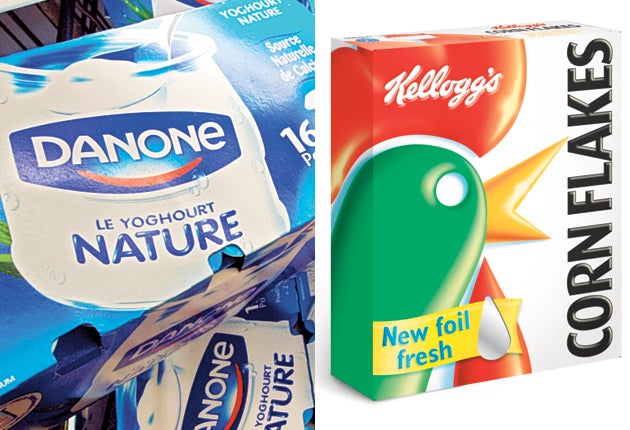Laid bare, the lobbying campaign that won the food labelling battle

The lobbying carried out by food manufacturers to block a European-wide food labelling system backed by doctors is laid bare in a series of private emails published today by The Independent.
In a flurry of statements and position papers to MEPs in the run up to key votes, Kellogg's, Danone, Coca-Cola, Nestle and other manufacturers claimed that colour-coded traffic lights were incapable of informing shoppers about the right diet.
They claimed that studies showed that their favoured percentage-based Guideline Daily Amounts (GDAs) had wide consumer acceptance. Polls by the National Heart Forum and the consumer group Which? that looked at both systems found shoppers preferred colour-coding.
On Wednesday, the European Parliament rejected the traffic light system devised by the Food Standards Agency vote in favour of GDAs. At the same time, they backed the compulsory labelling of harmful trans-fats and country of origin on processed products.
Glenis Willmott, the leader of Labour's MEPs, accused the food industry of heavy-handed tactics. "People weren't being told the full facts and the amount of time and money poured in by lobbyists was huge," she said. "It must have had an impact."
Mette Kahlin, policy advocate for Which?, said: "While I was lobbying in Brussels for Which? it was clear I was outnumbered by industry lobbyists 100-1. Consumer and health organisations don't have enough money to match that."
Devised by the UK Food Standards Agency in 2006, traffic lights show red lights for high levels of salt, fat and sugar, and amber and green for lower amounts. The British Medical Association, British Dietetic Association and British Heart Foundation are among the health groups that support the scheme.
On Monday, the Ad Hoc GDA Group, representing 11 manufacturers including Kellogg's, Mars, Nestle and Unilever, emailed MPs in a last-ditch attempt to swing their vote. "We still believe that a traffic light approach provides too judgmental an assessment of foodstuffs – the complex nutritional composition of a food and its place in the diet cannot be reduced to a single colour," they wrote.
In an earlier email, Nestle France warned that the introduction of a colour-coded system would "in effect, create an arbitrary judgement about the food and this, in total disconnection with dietary requirements."
Coca-Cola even claimed that a diet based upon green lights could be harmful. In a document headed "Food labelling, basic elements for discussion", sent in 2008, the US fizzy drinks giant told MEPs: "Colour coding gives the consumer false assurances. A diet based upon products with green lights would lead to chronic nutritional deficiences."
"The briefings are not based on evidence," protested Ms Kahlin, of Which?
"In the UK we have had traffic lights and no one has been admitted to hospital with malnutrition from eating food signed with green lights. People still eat products marked red but they become aware of what is in their food."
The EU wants to introduce a unified labelling system to cut obesity, diabetes and other illnesses, which are causing millions of lost days at work and billions of pounds in health costs. Poor diet is thought to kill 70,000 people in the UK every year.
At the request of the Food Standards Agency, retailers Sainsbury's, Waitrose and Asda have put traffic lights on their own-label products, but they have been fiercely opposed by Tesco and multinational manufacturers.
In recent months, Pepsico, Danone and other global food giants and trade groups have mounted one of the biggest lobbying operations in EU history.
Lobbyists accosted MEPs in bars and restaurants and began turning up in their offices without appointments. They bombarded MEPs with documents, reports and factsheets praising GDAs and undermining traffic lights.
The lobbying was aimed at members of the Environment committee before a key vote in March, when it rejected traffic lights by 32-30. All 736 MEPs were targeted in the run-up to Wednesday's vote.
Manufacturers maintained the lobbying was based on solid evidence.
Kellogg's said: "If we're to win the obesity battle, consumers need a labelling scheme that gives them a much greater understanding of what's in their food so they can make informed choices. GDAs do this in a way traffic lights simply can't, and that's why we'll continue to use and support them."
Coca-Cola said: "Our communication to MEPs was based on thorough research of European consumers that is publicly available."
Nestle said: "GDAs are factual and objective and ensure consumers can evaluate a product's role in their daily diet."
Unilever, Mars and Danone were unavailable for comment.
What the food giants told MEPs
Coca-Cola
As MEPS began to discuss food labelling two years ago, Coke emailed MEPs stating that GDAs were "an effective consumer education tool". It added: "Colour-coding is over-simplifying. It classifies food into 'good' and 'bad products' and does not take into account the amount consumed."
Danone
Danone voiced its support for GDAs, telling MEPs that research showed the system – "which has been confirmed" by the Parliament's Environment committee – fully informed consumers about the food composition of the products they bought.
Kellogg's
One of a group of companies in the Ad Hoc GDA Group, Kellogg's signed an email sent to MEPs, which stated that traffic lights were "too judgmental" about products high in salt, fat or sugar. Kellogg's has been a firm backer of "science-based" GDAs.
Nestle
Nestle said traffic lights would create "arbitrary judgements". The Swiss giant said the colour-coding would classify foodstuffs as "good" and "bad", whereas people should follow a "varied and balance diet which does not formally exclude any single food".
Join our commenting forum
Join thought-provoking conversations, follow other Independent readers and see their replies
Comments